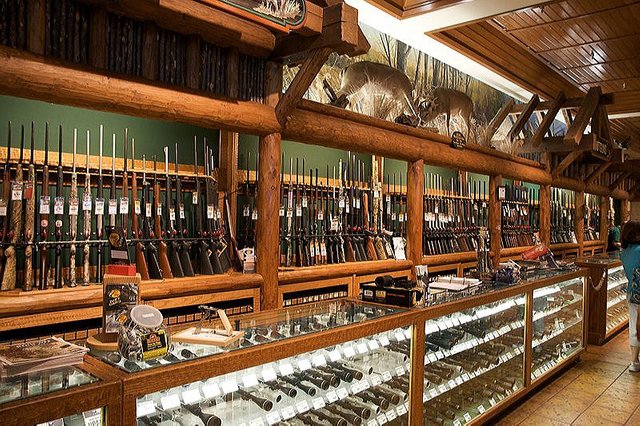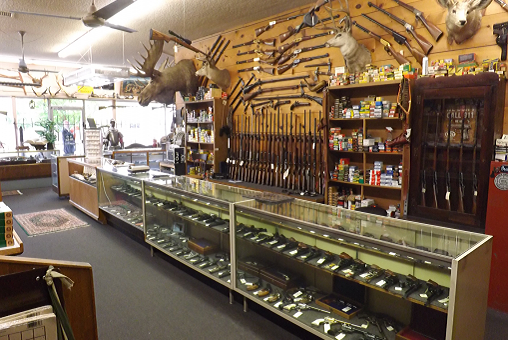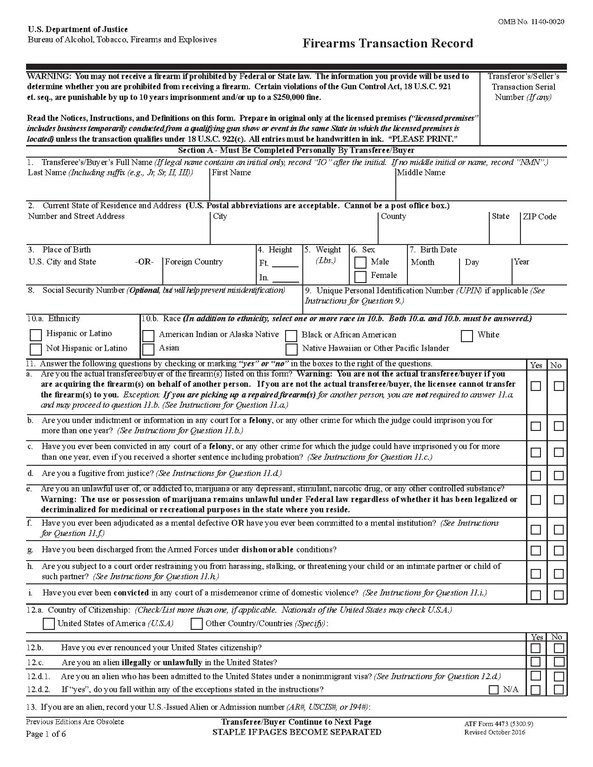Introduction to Firearms: Buying a Firearm
Hi there. Let's talk about how to go about buying a firearm.
In my previous posts I covered the basics of what a firearm is and how they are commonly used. If you haven't read those posts, I encourage you to do so here:
Absolute Basics of Firearms
and
Common Uses of Firearms
Now, I will go over the basics of actually obtaining a firearm, but I want to make something very clear before I start. The information presented here applies only and entirely to federal laws in the United States of America, unless I specifically mention otherwise. Federal firearms laws in America are the minimum baseline, and while each state largely follows federal laws, there are far too many exceptions and differences from state to state to cover in this article. I will provide some additional resources to look into at the end for state-specific laws. I will also not be covering the firearms purchasing laws in other countries in this article. If you have specific questions, feel free to comment and ask, just know that the scope of this particular article is simply federal laws in America.
So, how exactly does one acquire a firearm? Well, it's a fairly simple process and there's really only two paths, from a federally licensed dealer or from an individual private seller.
Purchasing a firearm from a licensed dealer
Probably the most common method of purchasing a firearm is from a licensed firearms dealer. Any established business that deals in firearms is going to have a Federal Firearms License, or FFL. This applies not only to gun stores specifically but also to places such as sporting goods stores, pawn shops, Wal-Mart, and dealers at a gun show. Federal Firearms Licenses are applied for through and issued by the Bureau of Alcohol, Tobacco, Firearms, and Explosives, commonly shortened to either BATFE or ATF.
FFLs have a number of different varieties based on what exactly the business does. A pawn shop will have a different class of FFL from a gun store, for example, but for your purposes as an individual buyer the class of FFL is largely irrelevant. I'll go into greater detail in a future article, but just know that any legitimate business that sells firearms will have a Federal Firearms License.
If, for some reason, you doubt that the business you're attempting to purchase from is actually licensed, then either ask to see verification or just leave and go somewhere else. This is America, you can probably find another gun store. Let's assume that you have and are comfortable making a purchase there.
All FFL dealers are required to perform a background check before allowing a sale. Depending on the state, there are some ways to, legally and legitimately, purchase from an FFL without a background check at the point of sale, largely based on state-issued permits to purchase or carry a firearm which require their own background check. However, we will be assuming you haven't gone through that process.
Once again, all sales done through an FFL will require a background check. This is a simple process and requires you to present valid in-state identification and fill out ATF Form 4473:
Here you can see the page you will primarily be concerned with. There are additional pages but those are largely for the FFL to fill out.
You can download the full ATF Form 4473 in .pdf format directly from the ATF's website here.
ATF Form 4473 requires you to provide valid information about yourself which includes:
Full name
Current address
Birth date
Height
Weight
Gender
Race and ethnicity
Place of birth
And optionally, but recommended, your Social Security Number
Followed by a series of questions. These questions determine whether or not you are a prohibited possessor of firearms, which will result in the FFL denying you the sale. It is a crime to lie on the form, and the FFL will utilize the National Instant Criminal Background Check System, more commonly known as NICS, to verify the information provided by both your personal identification and your completed ATF Form 4473.
Answering yes to any of the following questions means that you are a prohibited possessor and cannot legally own, let alone purchase, firearms and will result in the FFL refusing the sale:
Are you under indictment or information for a felony or any crime for which you can be sentenced to more than one year in prison if convicted?
Have you ever been convicted of the same?
Are you a fugitive from justice?
Are you an unlawful user of or addicted to any controlled substance? This includes marijuana, which is still illegal at the federal level regardless of state laws.
Have you been found by the court system to be mentally defective?
Have you ever been involuntarily committed to a mental institution?
Have you received a dishonorable discharge from the United States Armed Forces?
Are you currently under a court-ordered restraining order?
Have you ever been convicted of misdemeanor domestic violence?
Have you ever renounced your American citizenship?
Are you a non-American citizen that is in the country illegally?
Once again, if you can answer yes to one or more of those questions then you will not be allowed to purchase a firearm. The form has accompanying information regarding each question, as there are a few situations that can make it confusing to decide how to answer.
In addition, the form asks if you are purchasing the firearm for yourself. It is a federal crime to purchase a firearm for a prohibited possessor. This is called a straw purchase and is illegal. It is legal to purchase a firearm for someone as a gift, but the ATF suggests purchasing a gift card and allowing the recipient to go through the FFL process themselves. Otherwise, buying a firearm for someone else, who is both legally allowed to own firearms and a resident of your state, is not a straw purchase, and becomes a private sale, which will be discussed in the next section.
After you have completed the form, the FFL will contact the NICS system with the provided information, receive a confirmation or denial, and continue with the sale if your background check comes back clean.
FFL dealers are also fully and completely within their rights to deny a sale for any reason, even if the background check is passed, and are not required to disclose their reason for denial. At least one discrimination lawsuit that I'm aware of has failed due to the authority given to the FFL to deny sales. Some of the more common reasons for an FFL to deny a sale include suspicion of a straw purchase, suspicion of lying on Form 4473, and generally suspicious, erratic, or aggressive behavior. I am personally aware of several denials based simply on the customer "being a dick."
So, let's shorten that up a little bit.
When you make the decision to purchase a firearm from a licensed dealer you will visit the store and choose your firearm while being polite and courteous, present valid, in-state, identification to the store employee, fill out ATF Form 4473 honestly, accurately, and completely, wait for the employee to verify your information through the NICS system, and then pay for your firearm.
Congratulations, you are now a gun owner. Feel free to hop on Steem and tell me about your experience and what you bought. Now, make sure you know and obey the safety rules and take your firearm to the range. I'm happy you decided to join us. :-)
Purchasing a firearm from a private seller
Now, you also have the option of purchasing a firearm from an individual. Maybe a friend or coworker has a firearm for sale, or you found a sweet deal, or you want to sell a firearm. Whatever the reason, there are some very important things to keep in mind.
This section also applies to firearms given or received as a gift. Whether or not money is exchanged, transferring a firearm to another person qualifies as a private sale, or a private transaction, if that helps clarify the situation.
First of all, verify that your state allows private firearms sales. Currently, as of February of 2018, private sales of any firearm are entirely prohibited in the states of California, Colorado, Connecticut, Delaware, New York, Nevada, Oregon, Rhode Island, and Washington, as well as the District of Columbia. Private sales of handguns are prohibited in Maryland and Pennsylvania. These states require that the private sale be conducted through an FFL dealer that will conduct a background check.
Also, as of February of 2018, the states of Hawaii, Illinois, Massachusetts, and New Jersey for all firearms and the states of Iowa, Michigan, Nebraska, and North Carolina for handguns, require the purchaser to acquire a permit to purchase from their state that must be shown to the private seller.
If you live in any of the aforementioned states, I strongly urge you to research your state's laws regarding private sales. To be clear, I strongly encourage you to make sure you know your state's laws regardless of any information I provide you. I am not the state or federal government and I gaurantee you that your local law enforcement won't care what someone on the internet has to say about the topic.
Now, secondly, if your state allows private sales without going through an FFL, then your obligation, regardless of whether you are buying or selling, is to ensure that both parties are residents of the state you are in. This is important, as federal law does not allow for firearm sales to cross state lines without using an FFL. So bring your ID and ask to see their ID. If the other person does not provide their ID then the safest thing to do is to not go through with the sale.
Third, even though private sales do not, depending on state, require a background check, you are still legally prohibited from knowingly selling to someone that is a prohibited possessor.
So, to recap, to buy from or sell to another individual, you must obey your state's laws, you must both be residents of the state, and the buyer cannot be a prohibited possessor.
If everything is legal then the transaction can occur. It is very good practice to write out a bill of sale with both party's names and contact information, a description of the firearm, the payment exchanged, and some sort of statement by the buyer that they are not a prohibited possessor, and have both parties sign. This is not a requirement but it can, potentially, prevent some headaches.
So, assuming everything went well, you are now a gun owner. Congratulations, feel free to tell me about it, obey the safety rules, and go to the range. :-)
Additional situations
There are two particular areas I'd like to cover real quick. Both topics will likely see their own future article, but you should be aware of gun shows and online sales.
You may have heard of the "gun show loophole." Let me be very, very clear:
There is no such thing as a "gun show loophole."
What that term is referring to is simply a private sale that takes place at a gun show. It is a scary sounding, made up, nonsense term that attempts to play on fears of shadowy criminals at black markets to inspire laws against private sales.
FFL dealers at gun shows must obey the exact same laws they do at their own stores. Private sellers must obey the exact same laws they would for any other private sale in their state. A large number of gun shows have their own rules regarding authorized dealers and sales, largely to combat the "gun show loophole" myth.
Gun shows are not magical places that just ignore the law. There is no such thing as a "gun show loophole."
I think it's obvious, but I'm not a fan of the term.
Another common misconception that I'm not a fan of is the rhetoric around online sales. You may have heard of sites like GunBroker or Armslist, and you may have heard of them referred to as the eBay or Craigslist of guns. This is a fairly accurate representation of their general form, but their actual function is commonly misconstrued.
You cannot simply go online, order a firearm, and have it shipped to your door without any oversight.
You can purchase a firearm online. However, you must have the firearm shipped to an authorized FFL dealer and go through that process or you must meet, in person, and conduct a private sale. All state and federal laws still apply.
So yes, gun shows exist and you can buy guns there. And yes, you can purchase guns online. But there is no such thing as a "gun show loophole" and there is no such thing as an "online gun sales loophole." There are two types of gun sales: sales conducted through a federally licensed dealer and sales conducted by private citizens who are both residents of the same state, if allowed by their state.
Conclusion
There's a lot of misinformation regarding purchasing a firearm. Whether that misinformation is simply from ignorance or is intentionally misleading is beyond the scope of this post. However, I do hope that this post has helped clear some things up about the process. I encourage you to visit the ATF site here and utilize your state government's website to ensure you are well-informed regarding the laws that affect you.
The National Rifle Association maintains a list of state laws here, but I still encourage you to visit your state government's website, or even contact your local law enforcement office if you still have questions. Local gun stores will likely be very knowledgeable regarding local laws as well, but you are better off researching from official sources.
Now that you know what a firearm is, what you can use it for, and how to obtain one, I hope that you'll join me for future articles. My current intent is to finish out the basic introductory information with an article regarding proper maintenance and storage and an article regarding training and education resources. After that, I will likely begin going more in-depth with the topics I've already touched on.
I also welcome suggestions and requests, so if there's anything you'd like to see, please let me know in the comments. I'll gladly answer questions and, if the topic warrants, cover it in a full post.
So, thank you for reading, I truly appreciate your time, and I hope you'll join me in the future. Thank you. :-)




Thank you for your support of the 2nd amendment, and - nice to meet you...